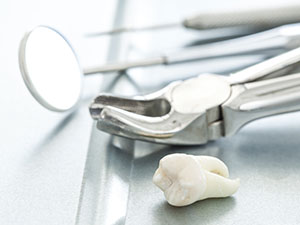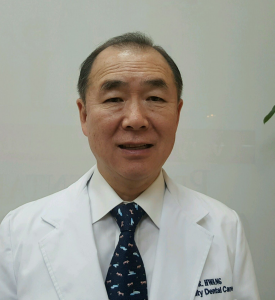

Sometimes it is necessary to extract a tooth. This can happen for a variety of reasons. Extractions are commonly performed in cases where a deciduous “baby” tooth is reluctant to fall out, a severely broken down and non-restorable tooth is present, or “wisdom tooth” is poorly positioned and unable to fully erupt into place.
To reduce any anxiety and insure patient comfort whenever a tooth extraction is necessary, the procedure, the post surgical instructions, as well as any restorative follow-up care will be carefully and completely explained.
Wisdom teeth, which are also known as the third molars, are the last permanent teeth to develop in the oral cavity as well as the final ones to come into place. However, as is often the case, many wisdom teeth do not have sufficient room to erupt, are not developing properly, or are causing issues for the adjacent teeth and the surrounding tissues.
A wisdom tooth is considered impacted when it is submerged under gum tissue or bone and unable to erupt into position. Based on the type and amount of overlying tissue, impactions are classified in a few different ways. Soft tissue impactions occur when a wisdom tooth remains covered by gum tissue. If a wisdom tooth remains completely, or partially obstructed by bone, it's known as a bony impaction.
Impacted wisdom teeth can potentially cause many problems and may need to be removed when they are the source of:
• Pain
• Infection
• Cysts
• Tumors
• Damage to adjacent teeth
• Gum disease
• Extensive tooth decay
Although the extraction of wisdom may be recommended for older patients, the early removal of problematic or potentially problematic wisdom teeth in young adults is often the case. Among the many reasons for this approach to care is that extractions at this stage of life are simpler, and patients experience a shorter recovery time with fewer complications.
Whatever the case may be, patients of all ages can rely on the expertise of an oral and maxillofacial surgeon for the evaluation and treatment recommendations for developing, impacted, or erupted wisdom teeth.
Dr. Bob Hwang, better known to his patients as Dr. Bob, received his Doctorate in Dental Medicine from the University of Medicine and Dentistry of New Jersey (UMDNJ) in 1981. Dr. Bob has proudly served as a dentist in the U.S. Army Dental Corp from 1981 to 1997. He has a talent of making his patients feel at ease and treating them with respect and compassion. His passion for dentistry is ever so strong even after all these years which benefits his patients greatly. Everyday, Dr. Bob strives to reduce cost, time and pain for his patients. Outside of dentistry, his passion involves serving his church and playing Ping Pong for better hand to eye coordination.

